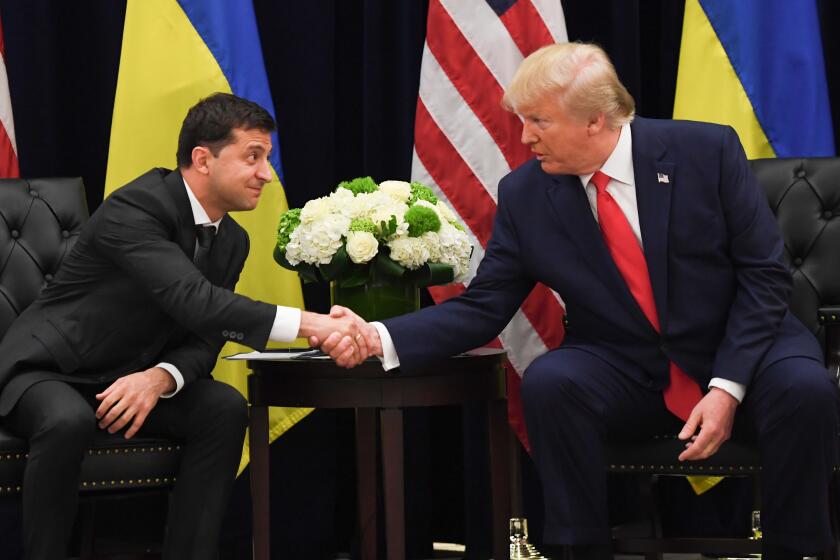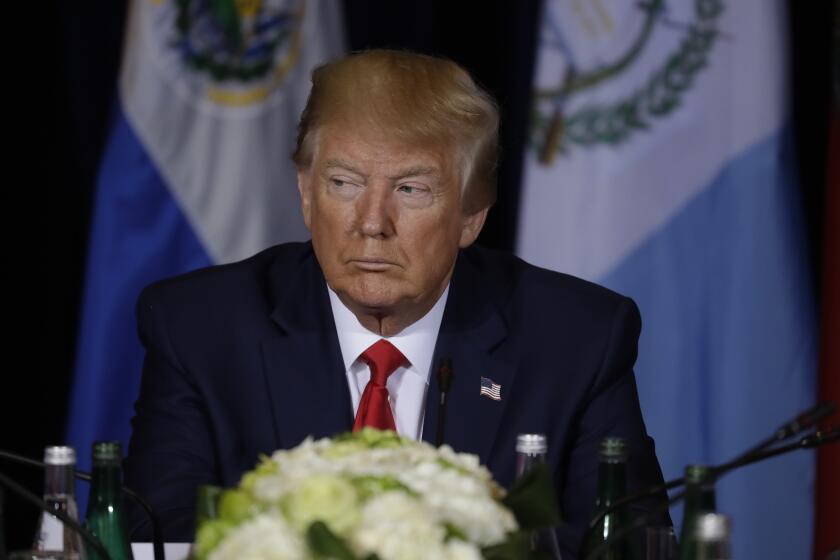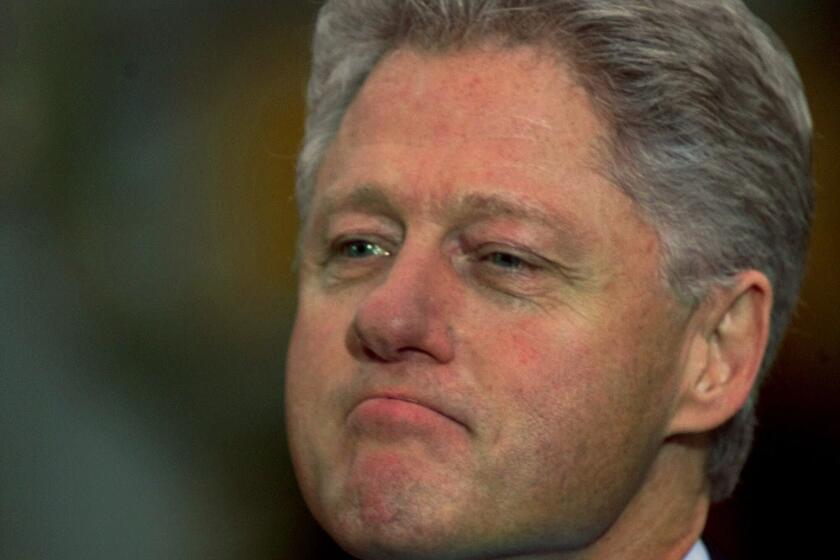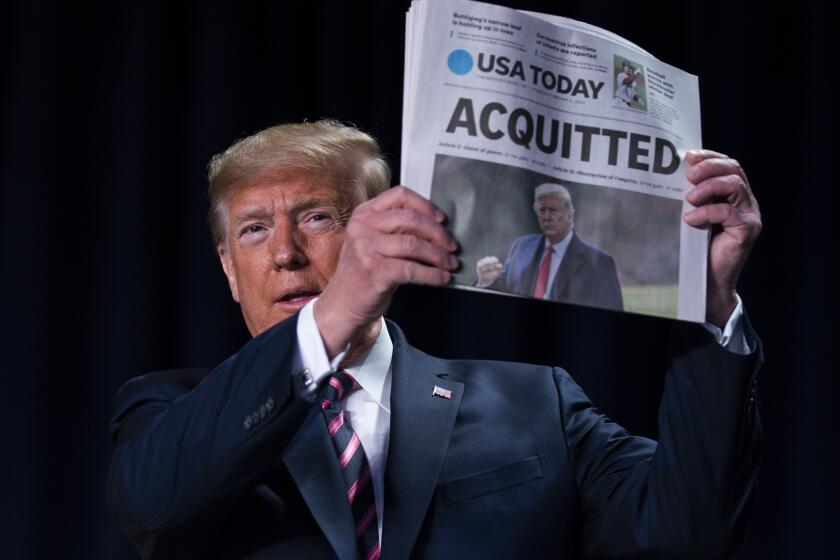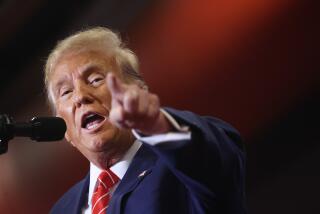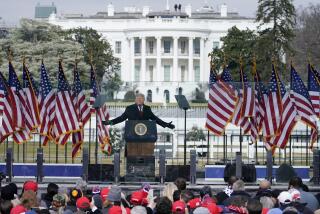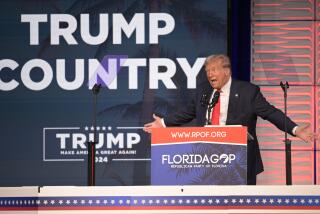Trump’s actions with Ukraine epitomize framers’ idea of impeachable offense, scholars say
Legal scholars who have studied impeachment say it was not intended as a means to remove a president who commits any crime or loses the support of other politicians. Rather, it was designed for removing from office a chief executive who grossly misuses his authority to benefit himself and sacrifices the public good.
And many agreed Wednesday that pressing a foreign leader to investigate a political rival — while withholding hundreds of millions in promised U.S. aid — would clearly qualify as an impeachable offense.
“Impeachable misconduct entails a president’s serious abuse of power and a serious abuse of public trust,” said University of North Carolina Law professor Michael Gerhardt. He said based on what has been reported so far, “President Trump’s call did both of those things. It was an abuse of power because he used his position to benefit himself and not the country. It was a breach of trust because Americans trust their president not to engage in self-dealing, either through steering businesses to line their own pockets or through conspiring with or coordinating with foreign powers to intervene in American elections.”
The focus of a House impeachment inquiry is President Trump’s request of Ukraine’s leader, according to a White House memo, to investigate Joe Biden.
Trump in recent days has acknowledged that he withheld congressionally approved aid to Ukraine as he simultaneously pressed the Ukrainian president to investigate his possible 2020 presidential opponent, former Vice President Joe Biden.
Harvard Law professor Cass Sunstein, who like Gerhardt, wrote a book on impeachment, stressed that the Constitution sets a high standard for impeachable offenses.
If the president was shown to be a shoplifter or accused of disorderly conduct or even cheats on his taxes, those alone would not be grounds for impeachment, Sunstein said. “The idea of ‘high crimes and misdemeanors’ is not a political term. It was understood as a legal term which came with a history,” he said.
The framers of the Constitution, having freed themselves from the king of England a decade before, were worried about creating a powerful, unchecked president in the future. They trusted George Washington, who reluctantly came out of retirement at Mt. Vernon to lead the Constitutional Convention and then serve as the first president. But they knew not all future presidents would follow Washington’s model of public service.
At one point, James Madison objected to the idea of impeaching a president for “maladministration” because that would give Congress too much sway over the chief executive. But the authors of the Constitution wanted to give Congress the authority to take action against a president who, as Alexander Hamilton put it, was guilty of a “violation of some public trust.”
The Constitution they wrote included a narrow provision that says: “The president, vice president and all civil officers of the United States shall be removed from office on impeachment for, and conviction of, treason, bribery or other high crimes and misdemeanors.”
President Trump was turning the page on the Russia investigation when he immediately found himself in an entirely new scandal.
Many scholars have tried to define those terms. In their book “To End a Presidency: The Power of Impeachment,” Harvard Law professor Laurence Tribe and Washington lawyer Joshua Matz wrote last year that “impeachable offenses involve corruption, betrayal or an abuse of power that subverts core tenets of the U.S. governmental system. They require proof of intentional, evil deeds that risk grave injury to the nation.”
Trump’s supporters are likely to argue that he has broad authority to speak with foreign leaders and that his phone conversation with the new president of Ukraine did not rise to the level of a criminal offense or risk “grave injury to the nation.”
The three past impeachments involving a president do not give clear guidance. The first arose from a momentous political fight that followed the Civil War and assassination of Abraham Lincoln. President Johnson, a conservative Democrat from Tennessee, clashed with the Republican-led Congress over Reconstruction in the South. He was impeached by the House, but his opponents fell just short of two-thirds vote needed in the Senate to convict and remove him.
Trump joins a small group of fellow presidents now that he’s the subject of an official impeachment inquiry in the House of Representatives. Only three of his predecessors underwent similar proceedings: Andrew Johnson and Bill Clinton, who were acquitted, and Richard Nixon, who resigned.
In 1974, President Nixon resigned when he faced impeachment in the House for conspiring to cover up the White House role in the Watergate break-in at the offices of the Democratic National Committee, including by subverting the CIA and the FBI.
In 1998, President Clinton was impeached by the House but acquitted by the Senate on the charge that he lied under oath to cover up his sexual affair with a White House intern.
While many saw Clinton’s offense as a “low crime,” Republicans who favored his removal said he had committed a crime nevertheless.
Former GOP Sen. Judd Gregg of New Hampshire, who voted for convicting Clinton in his impeachment trial, said the report on the Trump conversation was damaging and problematic, but does not rise to the level of a “high crime or misdemeanor.”
“My view is that you don’t remove a president for stupidity and inappropriate behavior,” said Gregg. “It’s problematic and politically stupid and substantively wrong and totally inappropriate, but is it a violation of law? I’m not aware that it is.”
Sunstein, who served in the Obama administration, said the framers were concerned with “an egregious abuse of authority.”
The White House notes released Wednesday do not show Trump directly threatening to withhold U.S. funds if Volodymyr Zelensky, the Ukrainian president, refused to investigate former Vice President Joe Biden and his son Hunter. But he also dropped a clear hint.
“I will say that we do a lot for Ukraine,” he said, adding the United States has been “very, very good to Ukraine.”
Later Trump says, “I would like you to do us a favor” and then suggests that Ukraine investigate Biden and his son Hunter.
Gerhardt, the UNC professor, said that fits the definition of an impeachable offense. “For a president to urge a foreign leader to investigate a political rival is a clear instance of impeachable misconduct. The framers believed such self-dealing was the essence of corruption and invented impeachment to get rid of it.”
Times staff writer Janet Hook in Washington contributed to this report.
The House of Representatives intends to vote to impeach President Trump for abusing his office and obstructing Congress, a condemnation that only two other U.S. presidents have faced in the nation’s 243-year history. Despite the historic nature of the vote on charging the president with committing high crimes and misdemeanors, Trump’s fate has been sealed for days, if not weeks in the Democratic-controlled House.
More to Read
Get the L.A. Times Politics newsletter
Deeply reported insights into legislation, politics and policy from Sacramento, Washington and beyond. In your inbox three times per week.
You may occasionally receive promotional content from the Los Angeles Times.
